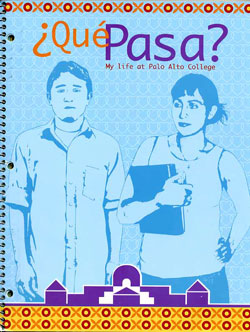
The Strategies for Succeeding
in College course has a new book this semester. The title, “¿Qué
Pasa? My Life at Palo Alto College,” tells you exactly what it is
about.
The book was developed by Rebeca Barrera and Roberto J. Quiroga and designed
by Angel Garza with money from a Title V Federal Grant.
“It has bright colors and keeps the students interested,” said
Janet Rangel, Counselor and Student
Development Instructor, who also contributed two stories and several ideas
for the book.
Counselors who teach
the Student Development course at Palo Alto College have been waiting
for a book like this to encourage, inform and excite students about being
in college.
According to the President of Palo Alto College, Dr.
Ana M. “Cha” Guzmán, 45 percent of the students in
the Strategies for Succeeding in College Course are first-generation college
students, meaning their parents did not attend college.
“We need to provide our students with the savvy advice that parents
who attended college give to their own kids,” said Guzmán.
Mary Apolinar, Chair of Counseling
and Assistant Professor of Counseling, said, “College is difficult,
but if you hang in there you’ll see the light at the end of the tunnel.”
Besides being a textbook for the Student Development class, it is also
a planner that can be used from 2006 all the way through 2009.
“I don’t like that that you have to put the dates in yourself,”
said Ryan Dranowsky, a freshman History major, “but that’s just
me.“
The book may be purchased at the college
bookstore for $11.88, but students like Dranowsky believe that if the course
is free, the book should be, too.
Nevertheless, its assets include a dateless weekly planner that allows the students
to plan their time; dichos, or sayings, that inspire and encourage the 68 percent
Hispanic student body; and it even gives studying tips. There is also a place
to write your school and work schedules.
“I use it for my school schedule, and I love it,” said Monica Rodriguez,
a freshman Psychology major. But other students like Benjamin Lewkowski, a freshman
Veterinary Technician major, only use it for the class.
Filling the book are articles that inform, encourage or excite students about
school, life and health. It even contains a list of important phone numbers
for different centers and offices on campus. At the bottom of each week’s
page, there is a Website or Websites for students to visit and learn more about
the articles they read.
Every week has a specific story assigned to the opposite page to connect the
student to the community. It gives the students that feeling of, “Hey,
it can be done. It isn’t easy, but it can be done,” said Anthony
Pierulla, Assistant Professor of Counseling.
“The stories are interesting,” said Dave Parma, a freshman History
major. The stories vary in topic and character. You might read a story about
how the brain works, and then turn the page to discover tips on how to have
a safe Spring Break followed by a feature on the Mission Trails.
One of the stories in ¿Que Pasa? is about Palo Alto’s very own president.
When Guzmán was 13, her family had to leave her home country of Cuba
and move to the United States.
“Anita, you do not need to worry. Fidel Castro can take our jobs, our houses,
and our industry, but he can’t take my education,” said Dr. Guzmán’s
father, Gabriel Guzmán.
Education became very important to the president. She graduated from Stout State
University, married and had two sons. She then went back to school to earn a
doctorate in education. She was appointed Chair of The Presidential Commission
on Educational Excellence for Hispanic Americans under President Clinton. Now
a leading voice for Hispanic Americans in education, she is the first woman
president of Palo Alto College.
There are many inspiring stories like hers that show that others have gone through
tough situations but still managed to succeed.
Whether you’re in the class or just a Palo Alto College student who needs
help organizing your academic and social life, this book is for you. If you’re
still skeptical, check it out for yourself in the college bookstore.
“Students like it,” said Rangel. “Any Palo Alto student can use
this book. I would definitely recommend it!”